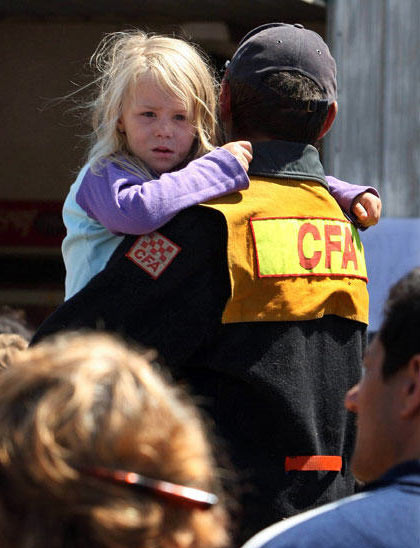
|
|
Fire continued to ravage across southern Australia Tuesday, threatening local communities and killing at least 181 so far. [Xinhua]
|
Victorian state Police and Emergency Services Minister Bob Cameron said his government would not consider making fire evacuations mandatory as it awaits the recommendations of a commission investigating the disaster.
"We know that when you have compulsory evacuation, you end up with lots and lots of collisions on the road," he told Australian Broadcasting Corp. television.
In Victoria, there is no formal alert system of text messages or phone calls to warn residents of approaching wildfires, though the state's Country Fire Authority regularly posts updates to its Web site on individual blazes along with advice for residents. The service's updates are also broadcast over the radio.
In the worst conditions, like Saturday's, the direction and intensity of fires can change so quickly that sirens, e-mail and other possible warning systems are not effective, officials say.
Brumby said a national emergency warning system for wildfires should be considered, and that he wrote to Prime Minister Kevin Rudd about the idea months ago.
Survivors were divided on the issue.
Brooke Coleman, 29, said her family followed their prepared fire plan, she left with her 18-month-old daughter and husband Zack stayed to try to protect their house, one of few that survived in Kinglake.
"We wouldn't have a house if my husband hadn't stayed up there," said Coleman, whose husband lived in the town, and with wildfire threats, all his life.
Tim Hubbard left his house in Healesville with his wife and five children when he heard the fire was closing in.
"I think there should be a line drawn on this 'make up your own mind whether you stay and fight,'" he said. "I'd be absolutely fine with being told to evacuate. Sometimes you can't stop where the fire is going to go, it doesn't matter how much fighting you do."
The scale of the disaster shocked a nation that endures deadly firestorms every few years. Officials said panic and the freight-train speed of the flames probably accounted for the unusually high death toll.
Some experts suggested the large number of deaths could also be partly due to a change in the makeup of the population in the areas blackened by the blazes.
There are more people living on the outskirts of cities like Melbourne who have no experience with wildfires, relying on the resources of the Country Fire Authority for help with the blazes, said Mark Adams of the Bushfire Cooperative Research Center. It used to be that families that lived in such areas were usually prepared with equipment to fight the fires themselves, Adams told ABC Television.
Rudd addressed the tragedy in Parliament, which suspended normal debate for a second day to hear condolence speeches.
The possibility of arson, "leaves us speechless," he said. "There is no excuse for this, none at all. This ... is simply murder on a grand scale."
President Barack Obama telephoned Rudd on Monday night to convey his condolences to the victims. Obama offered US assistance to help with the fires. Dozens of other world leaders also sent condolences.
Kevin Olson, chief of California's Department of Forestry and Fire Protection, said southeastern Australia faces some of the same fire problems because of similar climates and topography as California, which is occasionally hit with devastating wildfires.
"Driving through Victoria, it's just like driving through coastal California. ... With the same heat, the same winds and dry fuels, California always has the potential to burn like that," said Olson, who has traveled to Victoria and hosts Australian firefighters when they visit the US.
Andrew Sullivan, senior researcher with Australia's Commonwealth Scientific and Industrial Research Organization concurred, saying both the US state and Australia combine the same dangerous conditions: "fire weather, fuel and people."
Firefighters on Tuesday were still battling more than a dozen blazes that burned out of control across Victoria state, although conditions were much cooler than Saturday. Forecasters said temperatures would rise later this week, posing a risk of flare-ups.
Of Australia's estimated 60,000 fires in forests and other vegetation each year, about half are deliberately lit or are suspicious, the government-funded Institute of Criminology said earlier this month.
(Chinadaily.com.cn via agencies February 11, 2009)